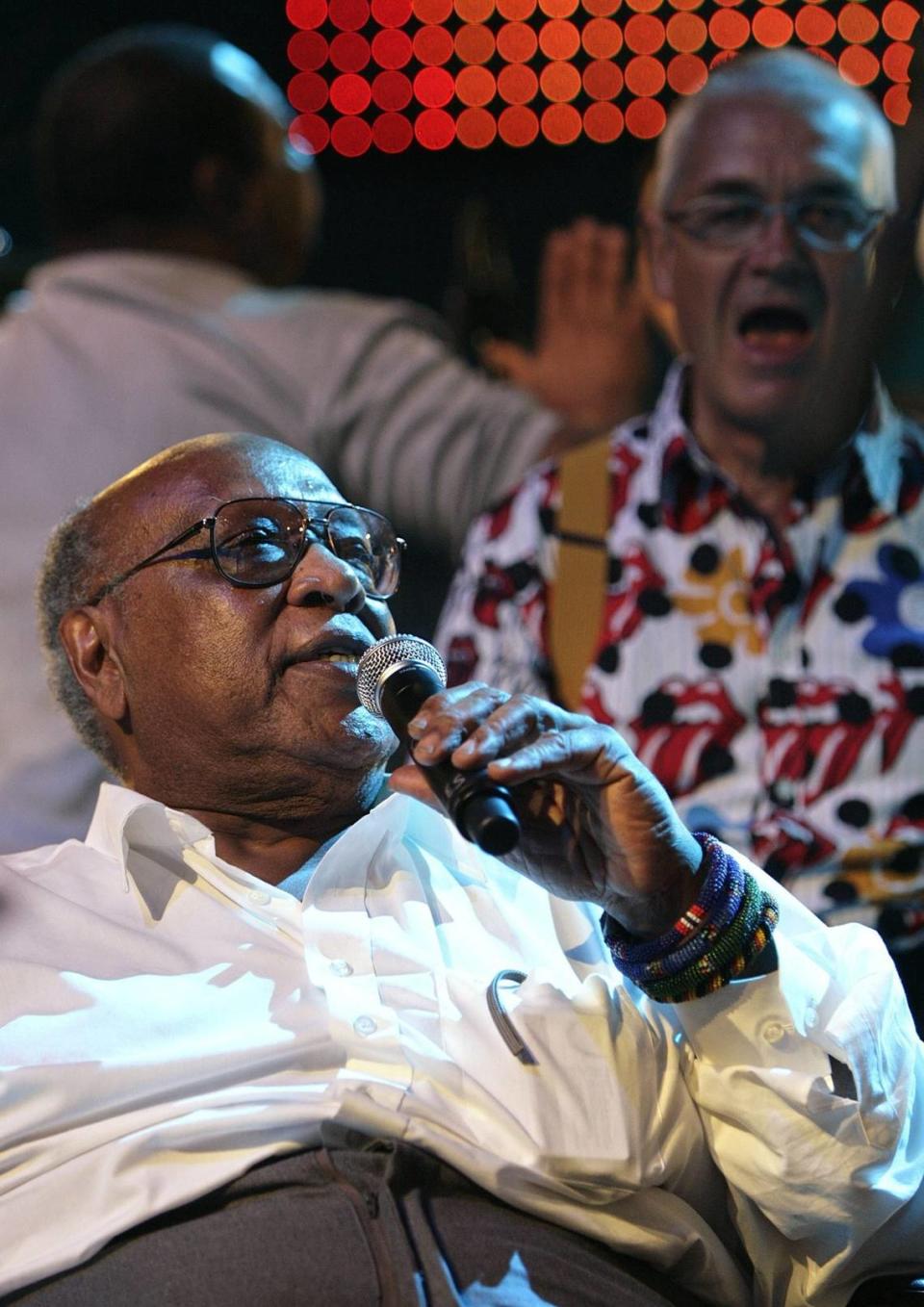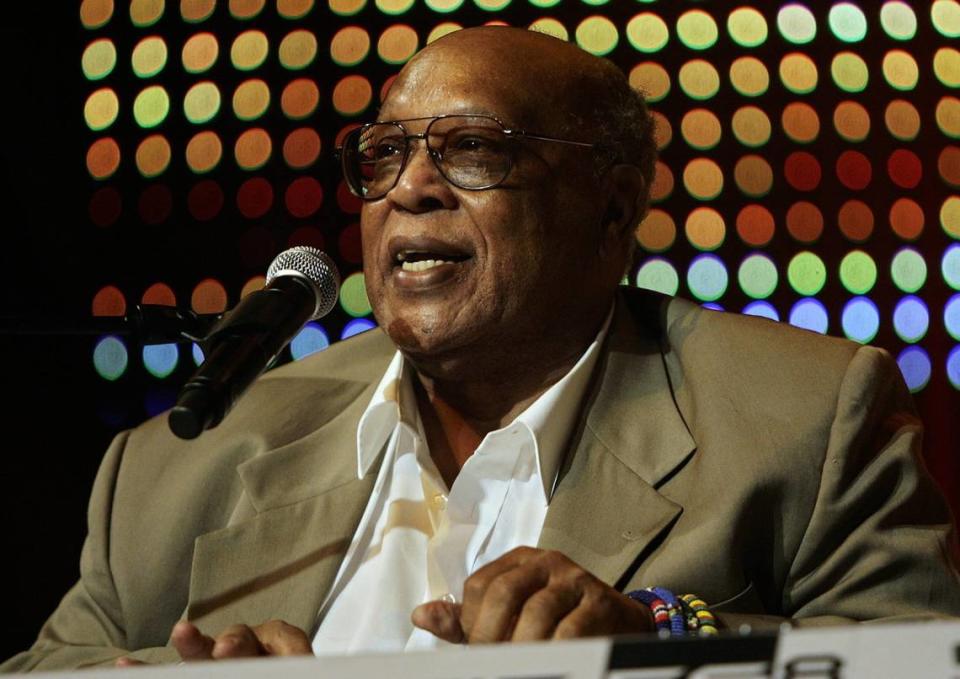Les McCann, Lexington native, jazz great, sampled by hundreds of hip-hop artists, dies
The road from Kentucky to Switzerland is as long as it is unlikely. We’re speaking of two countries with an ocean of culture vastly greater than the waters of the Atlantic separating them.
But in 1969, Lexington-born jazz giant Les McCann, who died Dec. 29 at the age of 88 in Los Angeles, found himself onstage at the Montreux Jazz Festival with saxophonist Eddie Harris for an unrehearsed performance preserved on a gem of an Atlantic Records album titled “Swiss Movement.”
At that point, McCann had been an active jazz journeyman for over a decade, working from the West Coast where he relocated after a stint in the Navy. In those early years, he was primarily a pianist, though his jazz leanings steadily soaked in the soul, R&B and pop accents that floated around him in the 1960s. At Montreux, all the soulful, genre-jumping abandon was ignited in the opening moments of “Swiss Movement.” Specifically, it erupted in a tune by Gene McDaniels, a singer who gigged regularly with McCann at the onset of the decade. But as the ’60s drew to a close, McDaniels was writing songs that mirrored the unrest of the times. Among them was a social protest tune called “Compared to What.”

Roberta Flack, who was also signed to Atlantic after being discovered by McCann, recorded the composition four months earlier. But when McCann dug into it at Montreux, all of the song’s emotive fibers — its stress, sass and soul — became electric. For those who knew McCann strictly as an instrumentalist, his take on “Compared to What” revealed a vocalist with a natural sense of R&B groove and a fervency (and urgency) steeped in gospel. From that point on, singing would take an increasingly visible role in McCann’s career.
Through the years, everyone from Ray Charles to The Roots would record “Compared to What.” But with “Swiss Movement” permanently chronicling his Montreux triumph, the tune would forever serve as the signature hit of Les McCann. Today, hundreds of other musicians would tap into his genius by sampling his work including Snoop Dogg, Sean Combs, The Notorious B.I.G. Mary J. Blige, and more.
Les McCann born in Lexington, went to Dunbar
McCann never forgot his Lexington roots, from singing with his siblings at the Shiloh Baptist Church to student days in the marching band at the original Dunbar High School on North Upper. After leaving Kentucky in his teens, performances in his hometown became scarce. He returned to play at the University of Kentucky’s Memorial Hall for the Spotlight Jazz series in the early ’80s. In 2013 and 2015, McCann performed at the Lyric Theatre and Cultural Arts Center, a venue where McCann was employed in his youth.
“I used to work at the Lyric when it first opened because my house was right around the corner on Eastern Avenue,” McCann told me in an interview prior to the 2013 concert. “That’s when I first got hooked on the music. I saw Dizzy Gillespie there and artists like (’50s era jazz/R&B stars) Wynonie Harris and Tiny Bradshaw. I saw a lot of the black chitlin’ circuit bands. Back then, that was the only place in town for that music. My mother didn’t mind. I told her I had a job nearby and was making money, so it was all good.”
Les McCann’s influence on music
McCann’s succession of 1970s albums for Atlantic were definitive examples of how organically soul groove and R&B temperament could be absorbed into jazz along with narratives that blended personal reflection and socio-political awareness.
“Les was OUT!!!!” wrote multi-Grammy winning jazz bassist and composer Christian McBride in a Facebook post following the announcement of McCann’s death. “He chose laughter. He chose positivity. He chose shock value. He chose to make soulful, funky music to make people feel good.”
2023, like many other years I believe, has been like a three-band EQ: highs, mids, & lows. We all share a lot of each....
Posted by Christian McBride on Sunday, December 31, 2023
That music included many recorded triumphs through the years. Two of them were — oddly enough, given McCann’s growing visibility as a vocalist — a pair of post-“Swiss Movement” instrumental albums the artist regularly cited as his favorite works.
“Two of my favorites through the years were ‘Layers’ (released in 1973) and ‘Invitation to Openness’ (from 1972). That one (‘Openness’) came to me in the middle of a dream one night. I called my record company the very next day and said, ‘I’ve got to do this.’ Fortunately, I had a producer (longtime Atlantic Records producer Joel Dorn) that trusted me.”
A similar trust emerged within a subsequent generation of hip-hop artists. De La Soul, Cypress Hill, Dr. Dre and A Tribe Called Quest, among many others, have sampled McCann’s music for their recordings.
It is perhaps short-sighted to continually reference an artist’s most enduring hit when paying tribute. But so much of the energy, innovation and sparking stylistic immediacy of McCann’s music is encapsulated in the “Swiss Movement” version of “Compared to What.”

The wind-up alone served as a primer to McCann’s sound. It began with a piano rumble that meant business. It was a simple riff that echoed vintage Motown. Listen to it and see if you hear a shade of the Temptations’ hit “Get Ready” at work. Well, McCann was ready, alright. The tune then opened up into an elegant piano reverie that reached further out to pop and soul terrain (there’s a lick from the 5th Dimension’s chart-topping cover of “Aquarius/Let the Sunshine In”) before McCann joyously put a metaphorical fist in the air as McDaniels’ topical lyrics, forged under the headlines of the late ’60s, came to life.
“I love the lie and lie the love, A-Hangin’ on, with push and shove. Possession is the motivation that is hangin’ up the (expletive) nation. Looks like we always end up in a rut. Tryin’ to make it real, compared to what? “
There were no ruts in McCann’s music. A few late ’70s album bowed perhaps a little too deeply to commercial trends of the times, but his sense of soul and celebration never wavered. Make it real? McCann did that and then some. Compared to what? To nobody. The jazz giant from Eastern Avenue will always be a heroic original.
